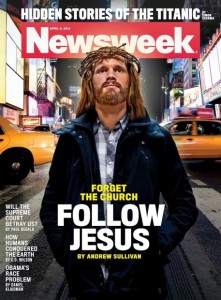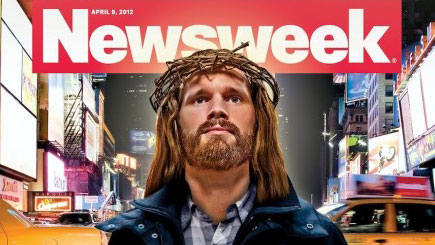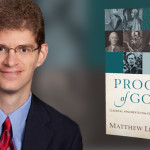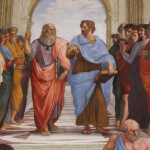Andrew Sullivan’s Non-Threatening Jesus
by Bishop Robert Barron
Filed under Culture, Jesus
A recent cover story for “Newsweek” magazine, penned by political and cultural commentator Andrew Sullivan, concerns the “crisis” that is supposedly gripping Christianity. Weighed down by its preoccupation with doctrines and supernatural claims, which are incredible to contemporary audiences, compromised by the corruption of its leadership, co-opted for base political ends, Christianity is verging, he argues, on the brink of collapse.
The solution Sullivan proposes is a repristinizing of Christianity, a return to its roots and essential teachings. And here he invokes, as a sort of patron saint, Thomas Jefferson, who as a young man literally took a straight razor to the pages of the New Testament and cut out any passages dealing with the miraculous, the supernatural, or the resurrection and divinity of Jesus. The result of this Jeffersonian surgery is Jesus the enlightened sage, the teacher of timeless moral truths concerning love, forgiveness, and non-violence. Both Jefferson and Sullivan urge that this Christ, freed from churchly distortions, can still speak in a liberating way to an intelligent and non-superstitious audience.
 As the reference to Jefferson should make clear, there is nothing particularly new in Sullivan’s proposal. The liberation of Jesus the wisdom figure from the shackles of supernatural doctrine has been a preoccupation of much of the liberal theology of the last 200 years. Hence, Friedrich Schleiermacher turned Jesus into a religious genius with a particularly powerful sense of God; Rudolf Bultmann converted him into the prototype of the existentialist philosopher; Immanuel Kant transformed him into the supreme teacher of the moral life. And this approach is very much alive today. Deepak Chopra and Eckhart Tolle, to give just two examples among many, present Jesus, not as the God-man risen from the dead, but rather as a New Age guru.
As the reference to Jefferson should make clear, there is nothing particularly new in Sullivan’s proposal. The liberation of Jesus the wisdom figure from the shackles of supernatural doctrine has been a preoccupation of much of the liberal theology of the last 200 years. Hence, Friedrich Schleiermacher turned Jesus into a religious genius with a particularly powerful sense of God; Rudolf Bultmann converted him into the prototype of the existentialist philosopher; Immanuel Kant transformed him into the supreme teacher of the moral life. And this approach is very much alive today. Deepak Chopra and Eckhart Tolle, to give just two examples among many, present Jesus, not as the God-man risen from the dead, but rather as a New Age guru.
The first problem with this type of theorizing is that it has little to do with the New Testament. As Jefferson’s Bible makes clear, the excision of references to the miraculous, to the resurrection, and to the divinity of Jesus delivers to us mere fragments of the Gospels. Matthew, Mark, Luke, and John were massively interested in the miracles and exorcisms of Jesus and they were positively obsessed with his dying and rising. The Gospels have been accurately characterized as “passion narratives with long introductions.”
Further, the earliest Christian texts that we have are the epistles of St. Paul, and in those letters that St. Paul wrote to the communities he founded, there are but a tiny handful of references to the teaching of Jesus. What clearly preoccupied Paul was not the moral doctrine of Jesus, but the resurrection of Jesus from the dead. And in the evangelical preaching of the first disciples—preserved in the Acts of the Apostles—we find, not articulations of Jesus’ ethical vision, but rather affirmations of the resurrection. St. Peter’s “you killed the author of life, but God raised him from the dead, and to this we are witnesses” (Acts 3:15) is absolutely typical. And from this followed as a consequence the affirmation of the Lordship of Jesus. One of the commonest phrases in the writings of Paul is Iesous Kyrios (Jesus is Lord), which carried a very provocative connotation indeed. For a watchword of Paul’s time and place was Kaiser Kyrios (Caesar is Lord), meaning that the Roman emperor was the one to whom final allegiance was due. In saying Iesous Kyrios, Paul was directly challenging that political and social status quo, which goes a long way toward explaining why he spent a good deal of time in jail!
And this leads to the second major problem with a proposal like Sullivan’s: it offers absolutely no challenge to the powers that be. It is precisely the bland and harmless version of Christianity with which the regnant culture is comfortable. Go back to Peter’s sermon for a moment. “You killed him,” said the chief of Jesus’ disciples. The “you” here includes the power structures of the time, both Jewish and Roman, which depended for their endurance in power on their ability to frighten their subjects through threats of lethal punishment. “But God raised him.” The resurrection of Jesus from the dead is the clearest affirmation possible that God is more powerful than the corrupt and violent authorities that govern the world—which is precisely why the tyrants have always been terrified of it.
When the first Christians held up the cross, the greatest expression of state-sponsored terrorism, they were purposely taunting the leaders of their time: “You think that frightens us?” The opening line of the Gospel of Mark is a direct challenge to Rome: “The beginning of the good news about Jesus Christ, the Son of God” (Mk 1:1). “Good news” (euangelion in Mark’s Greek) was a term used to describe an imperial victory. The first Christian evangelist is saying, not so subtly, that the real good news hasn’t a thing to do with Caesar. Rather, it has to do with someone whom Caesar killed and whom God raised from the dead. And just to rub it in, he refers to this resurrected Lord as “Son of God.” Ever since the time of Augustus, “Son of God” was a title claimed by the Roman emperor. Not so, says Mark. The authentic Son of God is the one who is more powerful than Caesar.
Again and again, Sullivan says that he wants a Jesus who is “apolitical.” Quite right—and that’s just why the cultural and political leaders of the contemporary West will be perfectly at home with his proposal. A defanged, privatized, spiritual teacher poses little threat to the status quo. But the Son of God, crucified under Pontius Pilate and risen from the dead through the power of the Holy Spirit, is a permanent and very dangerous threat.
That’s why I will confess that I smiled a bit at Andrew Sullivan as I read his article. Like the young Thomas Jefferson, I’m sure he thinks he’s being very edgy and provocative. Au contraire, in point of fact.
Related Posts
Note: Our goal is to cultivate serious and respectful dialogue. While it's OK to disagree—even encouraged!—any snarky, offensive, or off-topic comments will be deleted. Before commenting please read the Commenting Rules and Tips. If you're having trouble commenting, read the Commenting Instructions.













